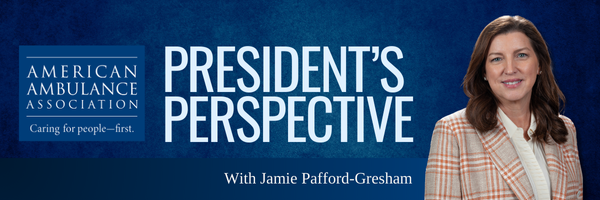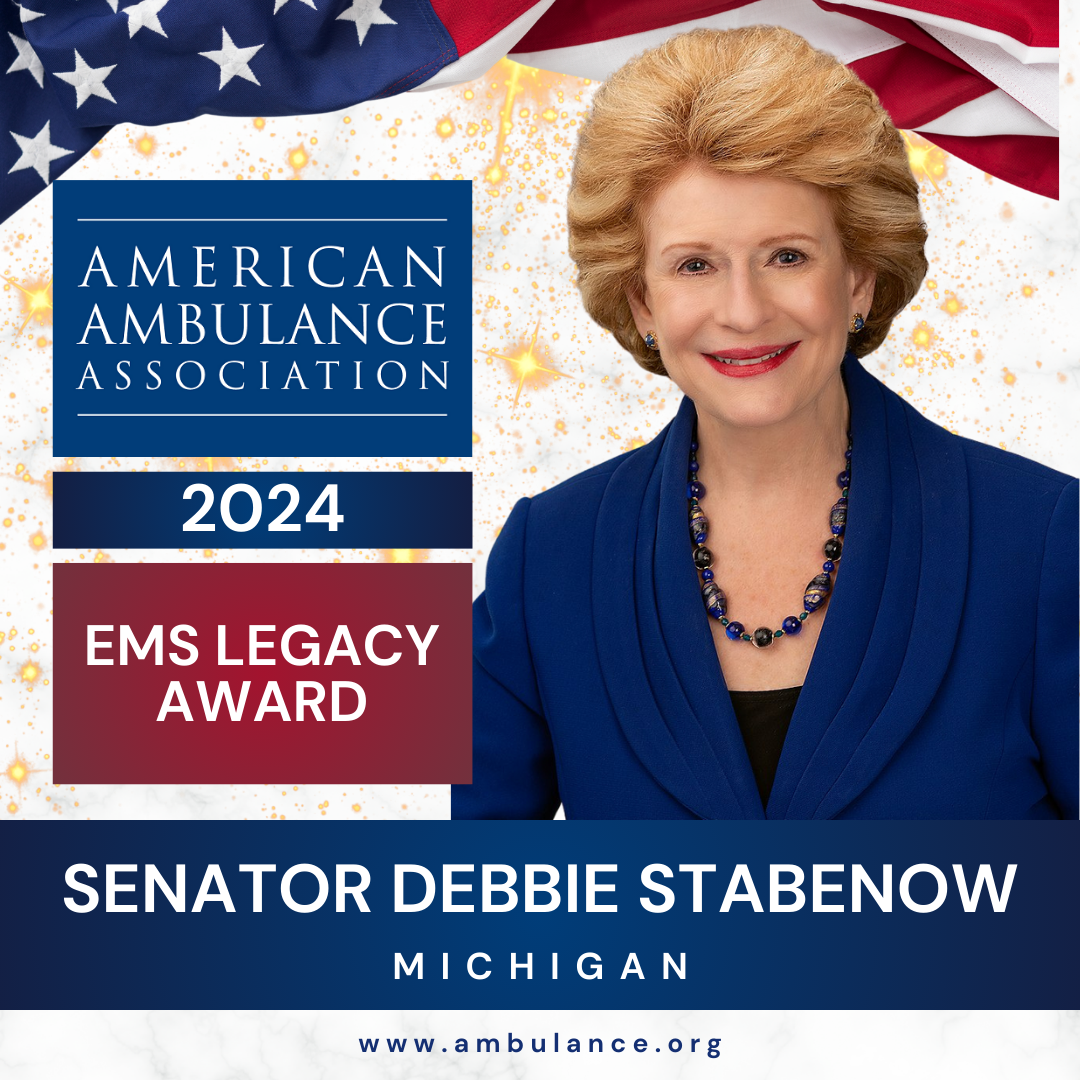Congress Extends Ambulance Add-On Payments Through September 30
Written by Tristan North on . Posted in Advocacy Priorities, Government Affairs, Legislative, Medicare.
Yesterday evening, March 14, the United States Senate by a vote of 54 to 46 passed the Full-Year Continuining Appropriations and Extensions Act, 2025 (H.R. 1968) to fund the federal government through the end of the 2025 fiscal year ending September 30. An extension of the current levels of the temporary Medicare ambulance add-on payments was included in H.R. 1968 with an expiration date of also September 30. President Trump is expected to sign H.R. 1968 into law shortly.
The AAA, our champions and supporters on Capitol Hill, and EMS partner organizations fought hard to ensure the ambulance extension was included in the lean bill of just 99 pages. We greatly appreciate the outreach by the AAA membership and state EMS associations to their members of Congress in support of the extension of the ambulance add-on payments. The AAA will continue to advocate for a long-term extension of the add-on payments at the higher levels of 3.4% urban, 4.3% rural and 26.7% super rural.
Revised versions of the Protecting Access to Ground Ambulance Medical Services Act with a long-term extension of the add-on payments, and at the higher levels in the Senate bill, will be reintroduced in the near future. Once introduced, we will be launching a new Call To Action asking you to contact your members of Congress to cosponsor the legislation
President Jamie Pafford-Gresham on the Ambulance Medicare Extenders
Written by Jamie Pafford-Gresham on . Posted in Medicare, Regulatory.
MedPAC Commissioners Recognize Importance of Ground Ambulance Services and Complexities of AFS
Written by Kathy Lester on . Posted in Cost Data Collection, Cost Survey, Medicare, News.
2025 Medicare Reference Manual Released
Written by Brian Werfel on . Posted in Medicare, Publications.
AAA Releases 2025 Medicare Rate Calculator
Written by Brian Werfel on . Posted in Medicare, Member-Only, Regulatory, Reimbursement.
On December 23, 2024, CMS posted a revised version of the CY 2025 Ambulance Fee Schedule Public Use Files on its website. These files contain the Medicare allowed amounts for the various levels of ambulance service and mileage. The file is organized by state, and by payment locality within each state. The 2025 Ambulance Fee Schedule Public Use File can be viewed by clicking here.
Unfortunately, CMS has elected in recent years to release its Public Use Files without state and payment locality headings. As a result, in order to look up the rates in your service area, you would need to know the CMS contract number assigned to your state. This is not something the typical ambulance service would necessarily have on hand. For this reason, the AAA has created a reformatted version of the CMS Medicare Ambulance Fee Schedule, which includes the state and payment locality headings. Members can access this reformatted fee schedule below.
The American Ambulance Association is also pleased to announce the release of its 2025 Medicare Rate Calculator tool. The AAA believes this is a valuable tool that can assist members in budgeting for the current year. This calculator has been updated to account for recent changes in Medicare policies, including the 2025 Ambulance Inflation Factor and the extension of the temporary adjustments for ground ambulance services (i.e., 2% urban, 3% rural, and super rural bonus) through March 31, 2025. This extension was the result of Section 3203 of the American Relief Act, 2025. Barring further legislation, these temporary adjustments will expire on March 31, 2025.
Note on Medicare Sequestration: Both the Ambulance Fee Schedule Public Use Files and the AAA Medicare Rate Calculator display the current Medicare allowables. Neither takes into account the impact of so-called “budget sequestration” on Medicare payments. By law, the sequester requires Medicare contractors (and Medicare Advantage insurers) to reduce the amounts they pay under the Medicare Ambulance Fee Schedule by 2% (i.e., 2% off the 80% of the Medicare allowable typically paid by the Medicare contractor).
CMS Posts Revised 2025 Public Use File
Written by Brian Werfel on . Posted in Medicare.
A Message from AAA President Jamie Pafford-Gresham
Written by Jamie Pafford-Gresham on . Posted in AAA HQ, Annual Conference & Tradeshow, Medicare, Stars of Life.
Happy New Year from Our New Association President

|
||||||||||||
|
|
||||||||||||
|
Congress Extends Medicare Ambulance Add-On Payments
Written by Tristan North on . Posted in Medicare, Member Advisories, News, Reimbursement.
On Saturday, December 21, the American Relief Act of 2025 (H.R. 10545) became law and thereby averted a partial federal government shutdown. Of critical importance to ground ambulance service organizations, H.R. 10545 also extends the temporary Medicare ambulance add-on payments of 2% urban, 3% rural and 22.6% super rural through March 31, 2025. In addition, the new law wipes clean the PAYGO scorecard preventing a potential 4% cut in Medicare reimbursement for ground ambulance and other Medicare services.
The House of Representatives passed by a vote of 366 to 34 the Continuing Resolution (H.R. 10545) to extend funding for the federal government just hours before reaching the previous funding deadline of midnight on December 20th. The Senate then passed H.R. 10545 by a vote of 85 to 11 late that evening. The CR funds the federal government primarily at current funding levels through March 14, 2025.
The negotiations on the American Relief Act were extremely tense with a more robust initial legislative package, which would have extended the Medicare ambulance add-ons for two years, being replaced with a slimmer bill with fewer and shorter health care provisions. The extension of ground ambulance service payments ended up being just one of twenty-five provisions in the final 118-page Continuing Resolution, which was originally over 1,600 pages.
The AAA greatly appreciates the advocacy of our champions and supporters on Capitol Hill to ensure that the temporary ambulance payments extension was included in the final CR. We also want to thank our AAA members for reaching out to their members of Congress to request their help with the add-on payments. We will continue to push for a longer extension of the ambulance payments at percentages higher than the current levels upon the expiration of the CR.
CMS Finalizes the Productivity Adjustment, Adds Prehospital Blood Transfusion to ALS2
Written by Kathy Lester on . Posted in Medicare, Member Advisories, News.
Senator Stabenow Receives Inaugural EMS Legacy Award
Written by Meghan Winesett on . Posted in Cost Data Collection, Legislative, Legislative Awards, Medicare, Press.
FOR IMMEDIATE RELEASE
Contact:
Tristan North
tnorth@ambulance.org
October 10, 2024
Senator Debbie Stabenow Receives Inaugural EMS Legacy Award from the American Ambulance Association
Washington, D.C. — Senator Debbie Stabenow has been honored with the first-ever annual EMS Legacy Award by the American Ambulance Association (AAA) for her exemplary leadership and unwavering commitment to emergency medical services (EMS) during her distinguished tenure in the United States Senate.
The award recognizes Senator Stabenow’s significant contributions to the EMS community, particularly her role in introducing and championing critical legislation. Notably, she was instrumental in the creation of the Ground Ambulance Cost Data Collection System, which enhances transparency and supports the sustainability of ground ambulance services across the nation. Additionally, Senator Stabenow’s efforts led to the successful extension of Medicare Ambulance Add-On payments for five years, a vital support mechanism that helps ensure reliable emergency medical care for Medicare beneficiaries.
The EMS Legacy Award underscores the critical importance of legislative support for emergency medical services, highlighting Senator Stabenow’s role in elevating these issues on the national stage. Her advocacy ensures that EMS providers have the resources and support needed to deliver high-quality care.
About the American Ambulance Association:
The American Ambulance Association is a nonprofit organization that advocates for the interests of ambulance service providers and the patients they serve. With a mission to advance the profession and improve patient care, the AAA provides resources, education, and support to its members and the EMS community.
CMS Announces CY 2025 Ambulance Inflation Factor
Written by Brian Werfel on . Posted in Medicare, Member Advisories, Member-Only, News.
CMS Notifies Individuals Potentially Impacted by WPS Data Breach
Written by Brian Werfel on . Posted in Medicare, News.
On September 6, 2024, the Centers for Medicare and Medicaid Services (CMS) announced that CMS and its contractor, Wisconsin Physician Service Insurance Corporation (WPS), have begun the process of notifying nearly a million Medicare beneficiaries that were potentially impacted by a data breach involving WPS.
The data breach involved WPS’ use of the third-party application MOVEit. MOVEit is a file transfer application developed by Progress Software. In May 2023, a hacker group called CL0P discovered a security vulnerability that allowed the company to steal sensitive information from secure databases used by numerous governmental agencies and corporations. This included the protected health information (PHI) of Medicare beneficiaries and non-Medicare beneficiaries stored within WPS’ databases.
The notices inform affected Medicare beneficiaries of the steps they can take to protect themselves. As part of its remedial efforts, WPS is offering affected Medicare beneficiaries one year of free credit monitoring from Experian.
CMS indicated that it was not aware of any reported incidents of fraud or improper use of a Medicare Beneficiary Identifier (MBI). However, CMS noted that, if the beneficiary’s MBI was potentially impacted, they would mail a new Medicare card with a new MBI to the patient. Thus, the data breach has the potential to impact the patient demographic information you currently maintain within your billing systems. This is especially true for AAA Members that operate in Medicare jurisdictions currently administered by WPS (Iowa, Indiana, Kansas, Michigan, Missouri, and Nebraska). Specifically, the MBIs on file for existing patients may no longer be accurate. This also has the potential to impact Medicare eligibility information that you receive from other parties like hospitals, skilled nursing facilities, etc.
AAA Members will have to make a business judgment on how to address these potential concerns. One possible option would be to implement a process to confirm the MBI of existing patients prior to the submission of new claims. Another possible option might be to implement internal procedures to flag claims that are denied for an incorrect MBI as potentially related to this issue, and to then verify the patient’s correct MBI prior to resubmitting any denied claims.
CMS Proposed Expansion of ALS-2 to include Low-Tier O+ Whole Blood Transfusions Fails to Include Additional Funding for the Services
Written by Kathy Lester on . Posted in Medicare, Member Advisories, News, Patient Care, Reimbursement.
The Centers for Medicare & Medicaid Services (CMS) has released the Calendar Year (CY) 2025 proposed rule that proposes changes to the CY 2025 definitions of ALS-2 services to include one type of whole blood product. The rule does not propose any other changes to the Medicare ambulance fee schedule for 2025.
CMS proposes expanding the list ALS-2 to include low-tier O+ whole blood transfusions. However, there is no new money added to support the provision of the additional services. Specifically, CMS states that most transports involving whole blood are already reimbursed as ALS-2 and no additional payment will be added. For the few instances when whole blood is used and not in connection with another ALS-2 service, the transport would now be reimbursed under ALS-2. If a ground ambulance uses a blood product other than low-tier O+ whole blood, there would be no opportunity for reimbursement unless the transport qualified for ALS-2 through another service.
CMS states:
“We believe that many ground ambulance transports providing WBT already qualify for ALS2 payment, since patients requiring such transfusions are generally critically injured or ill and often suffering from cardio-respiratory failure and/or shock, and therefore are likely to receive one or more procedures currently listed as ALS procedures in the definition of ALS2, with endotracheal intubation, chest decompression, and/or placement of a central venous line or an intraosseous line the most probable to be seen in these circumstances. Patients requiring WBT are typically suffering from hemorrhagic shock, for which the usual course of treatment includes airway stabilization, control of the hemorrhagic source, and stabilization of blood pressure using crystalloid infusion and the provision of WBT or other blood product treatments when available, but not necessarily the administration of advanced cardiac life support medications. Consequently, we do not believe it is likely that most patients who may require WBT would trigger the other pathway to qualify as ALS2, the administration of at least three medications by intravenous push/bolus or by continuous infusion, excluding crystalloid, hypotonic, isotonic, and hypertonic solutions (Dextrose, Normal Saline, Ringer’s Lactate).”
“However, not all ground ambulance transports providing WBT may already qualify for ALS2 payment. An ambulance transport would not qualify for ALS2 payment where a patient received only WBT during a ground ambulance transport, and not one or more other services that, either by themselves or in combination, presently qualify as ALS2. We believe WBT should independently qualify as an ALS2 procedure because the administration of WBT and handling of low titer O+ whole blood require a complex level of care beyond ALS1 for which EMS providers and suppliers at the EMT-Intermediate or paramedic level require additional training. In addition, WBT requires specialized equipment such as a blood warmer and rapid infuser. While there is no established national training protocol, many systems follow the guidelines of the Association for the Advancement of Blood and Biotherapies (AABB), which requires additional training that is 4 hours in length for paramedics and 6 hours in length for EMS supervisory staff. Medicare’s requirements for ambulance staffing at 42 CFR 410.41(b) include compliance with state and local laws, which here would establish appropriate training requirements with respect to WBT administration.”
“Therefore, we believe it is appropriate to modify the definition of ALS2 to account for the instances where patients are administered WBT but do not otherwise qualify for ALS2 payment. Of note, we do not have the authority to provide an additional payment, such as an add-on payment for the administration of WBT under the AFS.”[1]
CMS proposes this changed based on data showing that about 1.2 percent of ground ambulance providers/suppliers use some time of blood product, with the majority (60 percent of those carrying the low-tier O+ whole blood). CMS does not discuss the ongoing discussions of the blood community and medical profession about the appropriateness of this treatment versus other types of whole blood or blood components. Nor does it discuss the cost of providing these services. Moreover, it does not address how this proposal may affect the current blood shortage in the United States.
The AAA is working with our members, other EMS organizations, and the blood community to assess the clinical aspects of this proposal, but has identified the failure to address the cost of providing blood and blood products to ground ambulance services that are already woefully underfunded.
The AAA will prepare a comment letter to submit before the September 9 deadline. We also plan to work with members who would also like to provide comments on the proposed rule.
[1]CMS. “CY 2025 Payment Policies under the Physician Fee Schedule and Other Changes to Part B Payment and Coverage Policies; Medicare Shared Savings Program Requirements; Medicare Prescription Drug Inflation Rebate Program; and Medicare Overpayments.” Display Copy pages 1165-66.
2024 Medicare Reference Manual E-Book Released
Written by Brian Werfel on . Posted in Medicare, Publications, Reimbursement.
AAA Releases 2024 Medicare Rate Calculator
Written by Brian Werfel on . Posted in Medicare, Member-Only, Regulatory, Reimbursement.
CMS Announces 2024 Ambulance Inflation Factor
Written by Brian Werfel on . Posted in Medicare, Reimbursement.
CMS Ambulance Open Door Forum 11/30
Written by Samantha Hilker on . Posted in Cost Data Collection, Medicare, News, Reimbursement.
Impact of Partial Government Shutdown on Healthcare
Written by Tristan North on . Posted in Medicaid, Medicare.
CMS Releases Advance Copy of CY 2024 Physician Fee Schedule Proposed Rule
Written by Brian Werfel on . Posted in Medicare, Member-Only, Regulatory.
















